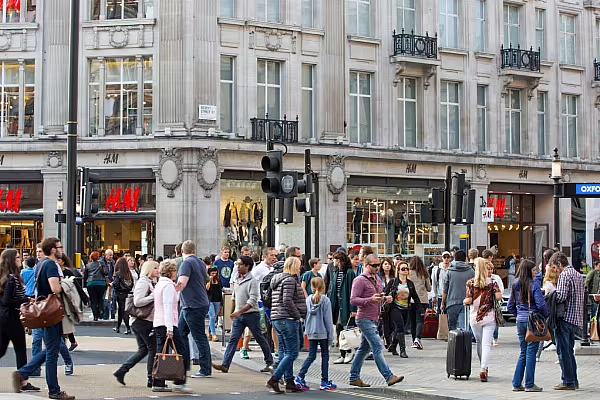British retail sales rebounded unexpectedly in June, driven by sales of antiques and second-hand clothes, raising hopes that a downturn in the second quarter could be softer than previously expected.
Sterling jumped to a day's high against the dollar after the figures showed monthly retail sales volumes jumped 1.0%, well above all forecasts in a Reuters poll of economists that had pointed to a 0.3% drop.
The Office for National Statistics (ONS) said sales were up by 3.8% compared with June 2018, again stronger than all forecasts.
Danger Of Shrinking
Many economists think Britain's economy is in danger of shrinking in the second quarter, a hangover from the stockpiling boom that took place ahead of the original Brexit deadline in March. But the unexpected strength of retail sales in June could help to reduce that risk.
The ONS linked the upturn to demand for second-hand goods from charity shops and auctions of antiques.
"The resilience of the consumer in the face of ongoing political uncertainty is both surprising and admirable, suggesting that despite heightened levels of uncertainty people are keeping calm and carrying on," David Cheetham, analyst from online broker XTB, said.
Weakest Reading
However, retail sales over the three months to the end of June grew by just 0.7%, the weakest reading since the three months to February.
The figures for June clashed with a British Retail Consortium survey that showed sales fell at the fastest annual pace on record for that month.
Some sectors did not enjoy a rebound last month, the official data showed.
Department store sales declined for a sixth consecutive month, the worst such run in records that date back to the late 1980s.
Brexit
Until recently, consumers have so far largely taken Brexit in their stride, helped by modest inflation and stronger growth in wages.
That has helped the world's fifth-biggest economy at a time when many companies have been cutting back on investment because of uncertainty about Brexit.
Stable inflation, a steady rise in wages and the lowest unemployment since 1975 have continued to boost household incomes, although after inflation wages are still below their peak before the financial crisis.
Cautious Consumers
But there have been other signs consumers are turning more cautious as Britain's political crisis drags on.
The two contenders to become prime minister next week have both said they are willing to take Britain out of the European Union without a transition deal, if necessary.
Major British retailers have reported mixed fortunes of late.
Health store Boots has warned of the risk of recession in Britain, while on Thursday fashion retailer ASOS dented profit expectations, saying problems in ramping up warehouses in the United States and Germany had hit sales and increased costs.
News by Reuters, edited by ESM. Click subscribe to sign up to ESM: European Supermarket Magazine.














